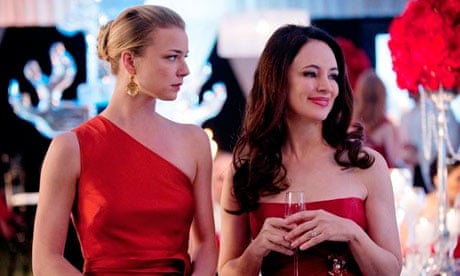It sounds so nice in theory. A hyper-rich American family, amoral to the core and living in the wealthy playground of the Hamptons, get their thoroughly deserved comeuppance at the hands of an ordinary American girl whose own family they destroyed.
In the age of the Occupy Wall Street movement that has popularised the concept of the 99% and demonised the activities of the elite 1%, no wonder such a story has a strong pull for the American public.
Of course, this is fantasy, not reality. While American politicians show little real sign of exacting much meaningful punishment on Wall Street bankers and the hyper-rich, the same cannot be said for US television, in the form of the new hit show, Revenge.
The ABC series, which began in the autumn, has won an audience of millions with a story that is aimed at bringing down at least one family of "one percenters". They are the Graysons, embodied by the evil matriarch of the clan, Victoria, played by the actress Madeleine Stowe. They live an exalted life of wealth and snobbery in the Hamptons area of Long Island, which has long been the playground for New York's elite. Victoria's husband, Conrad, is chief executive of the distinctly capitalist-sounding Grayson Global.
Their nemesis is Emily Thorne, played by Emily VanCamp, whose innocent father was sent to jail by the Graysons, and who returns to the Hamptons incognito to wreak her revenge.
But, in a time of hesitant recovery from the Great Recession, many are seeing the story as a 99% versus 1% narrative. "The Graysons themselves do stand in for the 1%. They are so extremely venal," said Jace Lacob, a television columnist for Newsweek.
Yet, bad as the Graysons are, the methods Thorne employs to exact revenge are extreme, from computer hacking to arson. Blood is spilled and people die. It is a long way from the tradition of camp American TV dramas such as Dallas, Dynasty and daytime soap operas, where the rich and their lifestyles are to be aspired to, not destroyed. "The show reveals the downside of wealth and materialism. These are people who are morally corrupt. It is a takedown of the ruling class," said Lacob.
Others go further, seeing Thorne as a cipher for the frustrations and unhappiness of ordinary Americans. "There is a little bit of Emily in all of us," said Richard Laermer, a celebrity expert and head of RLM, a public relations company. Nor is Revenge alone as a new drama with a political undertone. Ringer, another TV series, features one twin from a poor background assuming the identity of her identical sister, who is wealthy and has a summer house in… yes, you guessed it, the Hamptons. The twin, Bridget Kelly, played by Sarah Michelle Gellar, has to navigate the morally dubious, twisted ways of her dead sister's elite social life.
Then there is GCB, a new comedy drama that explores the shallow social mores of a group of wealthy Texan socialites. The heroine has fallen on hard economic times and as a result has become a better person.
Roseanne Barr, whose hit 1990s sitcom Roseanne was a rare primetime depiction of American working-class life, is meanwhile producing a pilot for Downwardly Mobile, a show where she plays the boss of a mobile-home park full of the economic casualties of the Great Recession.
However, if American audiences are showing a sudden political edge in their viewing, it is not one that extends to their foreign TV viewing habits. While Revenge may be a surrogate for the anger of the 99% at the American economic elite, viewers are at the same time big fans of Downton Abbey, which has become a huge hit in America.
Revelling in class warfare and rooting against the 1%, it seems, is something reserved for the current moment in their homeland. Or to put it another way, no one watching these shows was kicked out of their home or lost their jobs due to the actions of a British aristocrat. Thus an American audience can enjoy and admire the goings-on at Downton.
"The rise of Downton has happened because it is trapped in amber at a specific moment in time. There is a safe distance," said Lacob. The same cannot be said for a drama featuring super-rich Americans or powerful financiers. In popular culture, at least, some American viewers are now out for a little payback.

Comments (…)
Sign in or create your Guardian account to join the discussion